Roofing in Manhattan vs. Northern Virginia: How Urban Roofs Differ from Suburban Roofs
Roofing in Manhattan represents a dramatically different challenge than roofing suburban homes in Northern Virginia. Urban high-rise buildings feature flat commercial membranes, complex drainage systems, and accessibility challenges requiring specialized equipment and expertise. Meanwhile, suburban roofing focuses on pitched residential systems, aesthetic considerations, and homeowner preferences for materials balancing cost, appearance, and longevity. Understanding these fundamental differences helps property owners appreciate the unique requirements, costs, and contractor qualifications necessary for each environment. Whether managing Manhattan commercial properties or maintaining Northern Virginia suburban homes, recognizing these distinctions ensures appropriate solutions and realistic expectations.
The Fundamental Structural Differences
Manhattan roofing predominantly involves flat or low-slope commercial systems on multi-story buildings. These roofs utilize membrane materials like TPO, EPDM, PVC, or modified bitumen designed for water-shedding without pitched surfaces. Parapet walls, roof-mounted HVAC equipment, and telecommunications infrastructure create complex layouts requiring custom flashing and waterproofing details. Buildings exceeding three stories necessitate crane access, scaffolding, or specialized material hoisting systems.
Northern Virginia suburban roofing typically features pitched residential roofs with 4:12 to 8:12 slopes using asphalt shingles, metal panels, or occasionally tile materials. These systems rely on gravity drainage through valleys and gutters rather than membrane slopes and drains. Accessibility from ground-level allows ladder and truck access without cranes or scaffolding. The architectural emphasis on curb appeal drives material selections emphasizing aesthetics alongside performance. These structural differences parallel those seen when comparing flat commercial roofing with traditional residential systems.
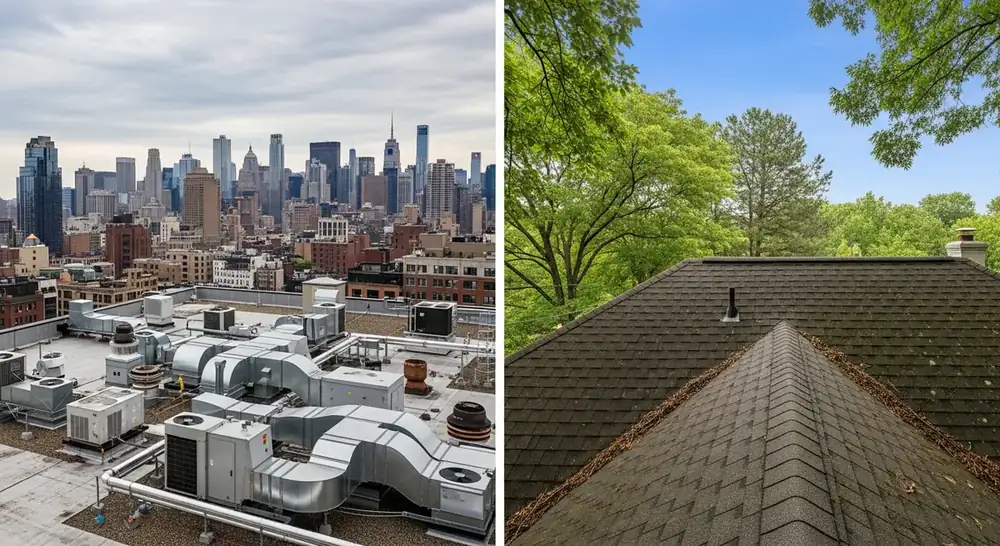
Access and Logistics Challenges
Roofing Manhattan buildings confronts extraordinary logistical complexities absent from suburban projects. Street closures require permits and coordination with city agencies. Material deliveries navigate narrow streets, limited parking, and strict time windows. Equipment placement must accommodate pedestrian traffic, vehicles, and adjacent businesses. Cranes require expensive permits, traffic control, and precise scheduling around weather and city regulations.
Material storage becomes problematic—limited staging areas force just-in-time deliveries coordinating with installation schedules. Debris disposal requires planning around limited access and city waste regulations. Noise restrictions limit working hours in residential areas. Northern Virginia suburban projects enjoy comparatively simple logistics—material deliveries to driveways, equipment placement on lawns, and flexible scheduling without municipal coordination. These access differences significantly impact project costs and timelines across both environments.
Building Code and Regulatory Differences
Manhattan enforces strict building codes addressing fire safety, structural loading, and public safety concerns unique to dense urban environments. Commercial buildings require specific membrane types meeting fire resistance standards, wind uplift ratings for high elevations, and compliance with NYC building codes among the nation's most stringent. Inspections follow rigid schedules with serious consequences for non-compliance.
Permits require detailed engineering drawings, proof of contractor licensing and insurance, and coordination with building management and condo associations. Northern Virginia suburban roofing operates under less intensive regulations—residential permits require simpler documentation, inspections focus on basic safety and weatherproofing, and homeowners enjoy greater flexibility in material choices. Both jurisdictions demand quality work, but the regulatory burden in Manhattan dramatically exceeds suburban requirements, affecting project costs and timelines. Understanding local requirements helps whether working in Reston or managing urban properties.

Material Selection and Performance Requirements
Manhattan roofing materials prioritize durability, fire resistance, and proven performance in harsh urban environments. TPO and PVC membranes dominate due to excellent weathering, chemical resistance against pollution, and strong heat-welded seams. Modified bitumen systems provide time-tested reliability for lower-rise buildings. Metal roofing appears on landmark buildings requiring longevity and architectural significance. Material selections emphasize performance over aesthetics since most urban roofs remain invisible from street level.
Northern Virginia suburban roofing offers broader material choices driven by aesthetic preferences and budget considerations. Asphalt shingles dominate due to favorable cost-performance balance and extensive color options. Metal roofing gains popularity for longevity and energy efficiency. Premium materials like slate or cedar shake appeal to high-end markets. Homeowners balance appearance, cost, energy efficiency, and neighborhood aesthetics when selecting materials. This consumer-driven selection process differs markedly from Manhattan's performance-focused commercial specifications, as seen in diverse roofing material options.
Climate and Environmental Considerations
Manhattan's urban heat island effect creates temperature extremes 5-10 degrees higher than surrounding areas, accelerating membrane aging and increasing expansion-contraction cycles. Air pollution deposits chemicals on roofing materials, potentially degrading certain membranes faster than in cleaner environments. Wind patterns between high-rise buildings create unusual pressure zones and uplift forces requiring robust attachment systems.
Limited vegetation and surrounding buildings reduce some weather exposure while creating unique challenges. Northern Virginia's suburban climate features seasonal temperature swings, abundant precipitation, and occasional severe storms without urban heat island intensification. Trees provide cooling benefits but drop debris requiring regular maintenance. Suburban roofs face different aging mechanisms—UV exposure, organic growth in shaded areas, and ice dam formation during winters. These environmental differences demand climate-appropriate material selections and maintenance approaches for optimal performance.
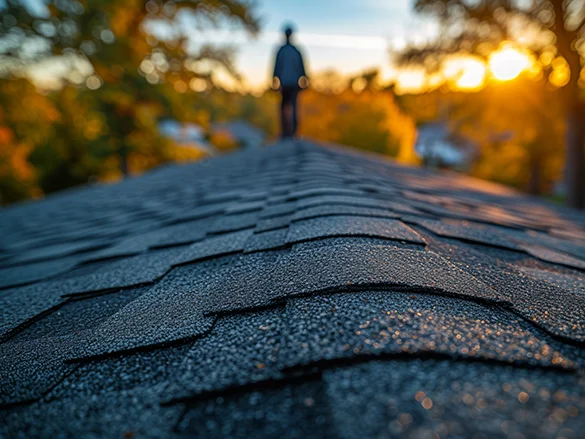
Cost Structures and Budget Considerations
Manhattan roofing costs dramatically exceed Northern Virginia suburban pricing due to numerous urban factors. Labor rates in NYC run 30-50% higher than suburban Virginia areas reflecting cost of living differences and union wages. Equipment costs—cranes, hoists, scaffolding—add thousands to tens of thousands to projects. Permit fees, insurance requirements, and regulatory compliance increase overhead substantially. Limited access and strict scheduling windows reduce crew productivity, extending project duration and costs.
Material costs stay relatively consistent between regions, though delivery charges to Manhattan sites may exceed suburban rates. Northern Virginia suburban roofing enjoys lower labor rates, minimal equipment costs beyond standard ladders and trucks, modest permit fees, and efficient installation schedules maximizing productivity. A flat roof installation costing $15,000 in Reston might run $25,000-35,000 for equivalent work in Manhattan. These cost differences reflect genuine expense variations rather than price gouging, as detailed in regional cost comparisons.
Contractor Qualifications and Specialization
Manhattan roofing contractors require specialized expertise, equipment, and credentials suburban contractors rarely need. Commercial roofing certifications, high-rise access training, and crane operation experience represent essential qualifications. Contractors must navigate union requirements, maintain extensive insurance coverage, and demonstrate experience with complex commercial systems. Project management skills coordinating multiple trades, building management, and city agencies become critical.
Northern Virginia suburban roofing contractors focus on residential expertise—customer service, aesthetic guidance, and efficient installation of pitched roofing systems. While professionalism matters equally, the skill sets differ substantially. A contractor excelling at Manhattan commercial work might struggle with residential customer relations and aesthetic consultation. Similarly, excellent suburban contractors may lack credentials, equipment, and experience for urban commercial projects. Choosing appropriately specialized contractors ensures quality results whether working with trusted residential roofers or commercial specialists.
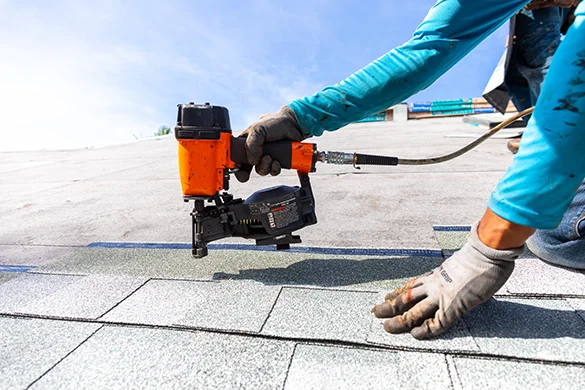
Maintenance Requirements and Accessibility
Manhattan flat roofs require regular professional maintenance—quarterly inspections identifying membrane damage, clearing drain lines, and addressing minor issues before they escalate. Ponding water from inadequate drainage demands prompt attention preventing membrane deterioration. HVAC equipment, roof penetrations, and foot traffic from building maintenance create ongoing wear requiring monitoring. Access difficulties make routine maintenance more expensive but absolutely essential for preventing costly emergency repairs.
Northern Virginia pitched roofs need less frequent maintenance—annual inspections clearing debris, checking flashing, and identifying shingle damage suffice for most homes. Gravity drainage reduces ponding concerns. Homeowners can perform basic tasks like gutter cleaning, though professional inspections remain advisable. Storm damage assessments follow severe weather events. The lower maintenance requirements and easier accessibility make suburban roof care more manageable and affordable than urban commercial roof maintenance, though both benefit from preventive approaches detailed in roof maintenance guides.
Emergency Repair Challenges
Emergency roofing repairs in Manhattan confront compounding difficulties. Leaks affecting multiple floors or tenants demand immediate response despite access challenges. Emergency equipment mobilization—cranes, personnel, materials—during off-hours costs premiums. Building management coordination, tenant notification, and damage mitigation in occupied buildings complicate repairs. Limited material storage requires emergency suppliers willing to deliver on short notice.
Northern Virginia suburban emergency repairs prove simpler though still stressful. Single-family homes limit damage scope compared to multi-tenant buildings. Direct homeowner communication eliminates building management coordination. Equipment access from ground level enables faster response. Material availability through local suppliers supports rapid repairs. While any emergency roof repair creates anxiety, suburban logistics allow faster, less expensive responses than complex urban scenarios. Establishing relationships with responsive contractors helps in both environments when emergency situations arise.
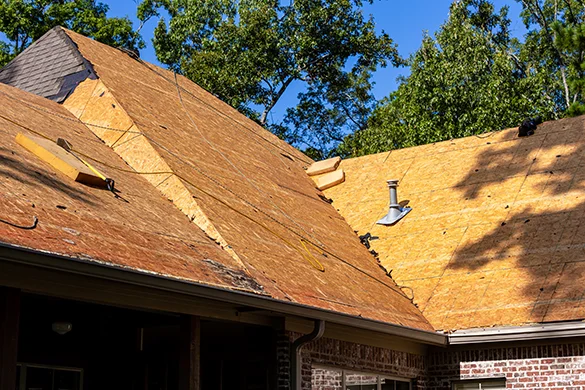
Warranty and Liability Considerations
Manhattan commercial roofing warranties typically involve complex arrangements between property owners, building management, contractors, and material manufacturers. Commercial warranties often require regular professional maintenance documentation for validity. Liability concerns in multi-tenant buildings necessitate extensive insurance coverage and careful contract language addressing potential damage to multiple units. Warranty work coordination requires building management approval and scheduling around tenant needs.
Northern Virginia suburban roofing warranties provide more straightforward protection—homeowners deal directly with contractors and manufacturers without building management intermediaries. Residential warranties require less formal maintenance documentation, though regular care remains important. Liability concerns focus on single-family property rather than multiple tenants. Warranty service scheduling accommodates homeowner preferences without building management coordination. These simpler warranty structures make suburban roofing more accessible for typical property owners.
Technology and Innovation Adoption
Manhattan roofing leads in adopting advanced technologies driven by commercial building demands. Cool roof coatings reduce urban heat island effects and lower cooling costs. Vegetative green roofs provide environmental benefits, stormwater management, and amenity space. Solar panel integration becomes economically viable on large commercial roofs. Advanced membrane technologies address pollution exposure and extreme wear.
Northern Virginia suburban roofing adopts technologies more gradually, driven by cost-benefit analysis and homeowner preferences. Solar shingles gain traction for aesthetically-conscious homeowners. Premium synthetic materials offering slate or shake appearance without maintenance appeal to specific markets. Energy-efficient cool shingles reduce cooling costs modestly. Suburban innovation focuses on improving traditional systems rather than commercial-scale technological leaps. Both markets benefit from advancement, though adoption timelines and drivers differ significantly based on building types and ownership structures, as seen in modern residential roofing options.
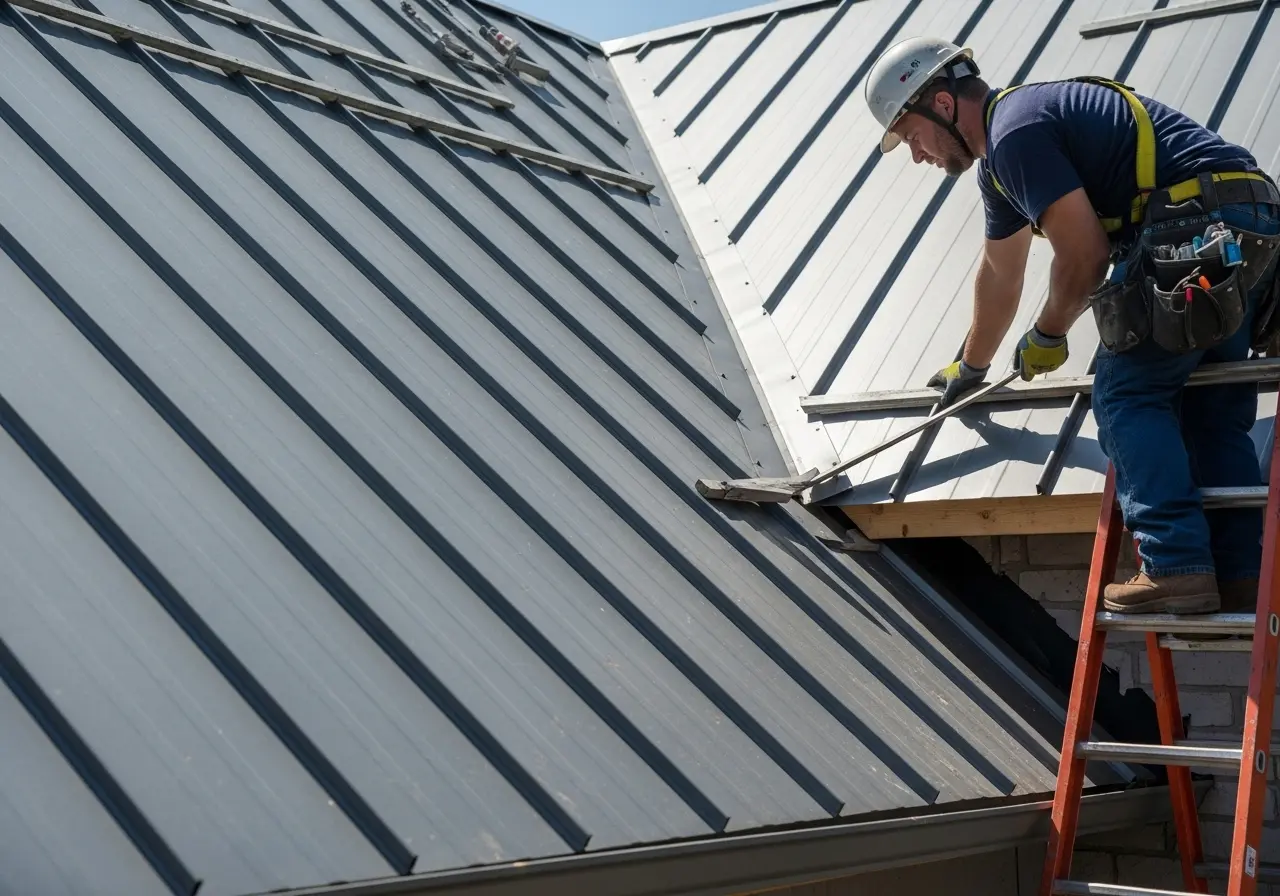
Seasonal Considerations and Weather Impact
Manhattan roofing schedules must navigate limited weather windows complicated by access restrictions and permit requirements. Winter work proves challenging due to cold affecting membrane adhesion and dangerous ice on high-rise access. Summer heat creates challenging working conditions on black roofs absorbing solar radiation. Spring and fall offer optimal conditions but compressed timelines given project complexities and contractor demand.
Northern Virginia suburban roofing enjoys more flexible seasonal scheduling. Shingle installation proceeds year-round in moderate weather, though extreme cold or heat reduce quality. Summer provides longest daylight hours maximizing daily productivity. Winter offers slower contractor schedules and potential discounts despite weather unpredictability. Property owners can often choose optimal timing balancing weather, contractor availability, and budget considerations without Manhattan's access and permit constraints affecting scheduling flexibility.
Why Location-Appropriate Expertise Matters
Understanding differences between Manhattan urban roofing and Northern Virginia suburban roofing emphasizes the importance of location-appropriate contractor expertise. Urban commercial specialists possess credentials, equipment, and experience suburban contractors rarely need. Conversely, residential specialists offer customer service, aesthetic consultation, and efficient small-project management commercial contractors may lack. Attempting to transfer approaches between environments leads to inefficiency, inappropriate solutions, and unnecessary costs.
Property owners benefit from contractors specializing in their specific environment and building type. Manhattan building owners need proven commercial roofing companies experienced with high-rise access, union labor, and city regulations. Northern Virginia homeowners need residential specialists understanding pitched roofing systems, aesthetic considerations, and homeowner communication. This specialization delivers optimal results at appropriate costs for each unique situation and market.

Lessons Transferable Between Markets
Despite dramatic differences, some roofing principles apply universally across urban and suburban markets. Quality materials and proper installation matter regardless of location or building type. Regular maintenance prevents small problems from becoming costly disasters everywhere. Proper ventilation and moisture management prove critical for longevity in all climates. Working with qualified, insured, licensed contractors protects property owners universally.
Comprehensive contracts detailing scope, materials, timeline, and pricing prevent disputes whether in Manhattan high-rises or Northern Virginia suburbs. Warranty coverage providing both material and workmanship protection delivers value in all markets. Preventive maintenance proves more economical than reactive repairs regardless of roofing system type. These universal principles guide successful roofing projects across diverse environments and applications.
Northern Virginia's Suburban Roofing Advantage
Northern Virginia homeowners enjoy significant advantages compared to Manhattan property owners. Lower costs make quality roofing accessible to broader populations. Simpler logistics reduce project stress and complexity. Greater material choices allow personalizing homes aesthetically. Direct homeowner-contractor relationships provide better communication and service. Easier maintenance access encourages preventive care extending roof lifespan.
While Manhattan roofing delivers on demanding commercial applications, suburban Northern Virginia roofing excels at residential quality, service, and value. Homeowners throughout Fairfax, Arlington, and Vienna access exceptional roofing services without urban complications or costs. This suburban advantage makes homeownership more affordable while delivering superior residential roofing solutions tailored to family needs rather than commercial building requirements.
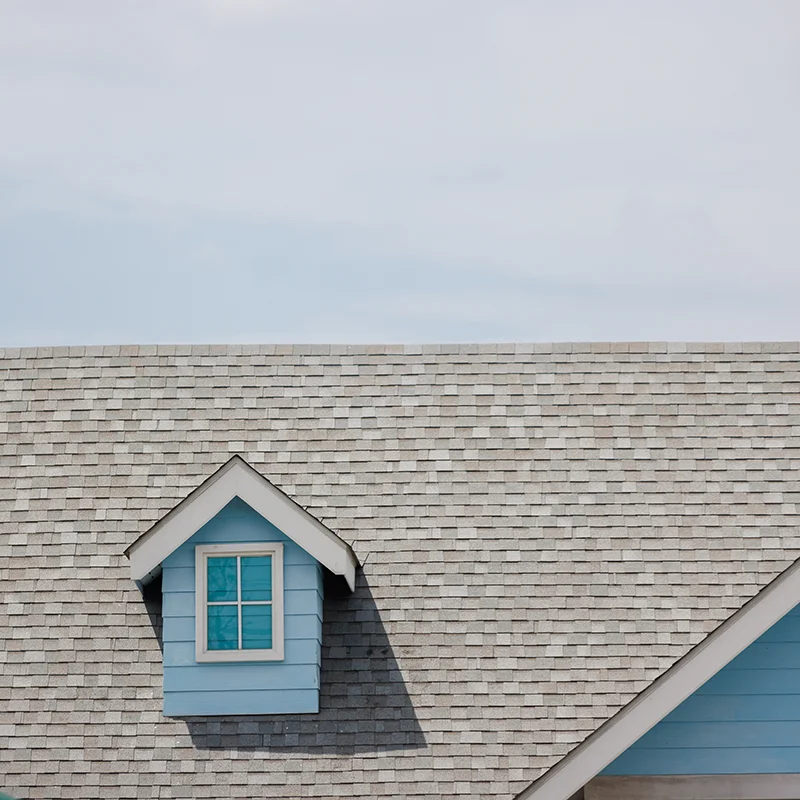
Get Expert Suburban Roofing Service
Understanding how roofing in Manhattan differs from Northern Virginia suburban roofing highlights the importance of location-appropriate expertise and solutions. Urban commercial roofing demands specialized contractors, equipment, and approaches unnecessary in suburban residential markets. Northern Virginia homeowners benefit from working with residential roofing specialists who understand pitched systems, aesthetic considerations, and homeowner service expectations absent from commercial environments.
Reston Roof specializes in suburban residential roofing throughout Northern Virginia, delivering quality materials, professional installation, and exceptional customer service at costs far below Manhattan's urban premiums. Our team understands pitched roofing systems, homeowner communication, and efficient project management delivering beautiful results without commercial project complexities. Contact us at (571) 453-6515 to experience the suburban roofing advantage. We provide free estimates, transparent pricing, and quality workmanship ensuring your home receives optimal protection and appearance. Discover why Northern Virginia homeowners choose local residential specialists over companies accustomed to Manhattan's commercial environment—better service, better value, and better results for your home.